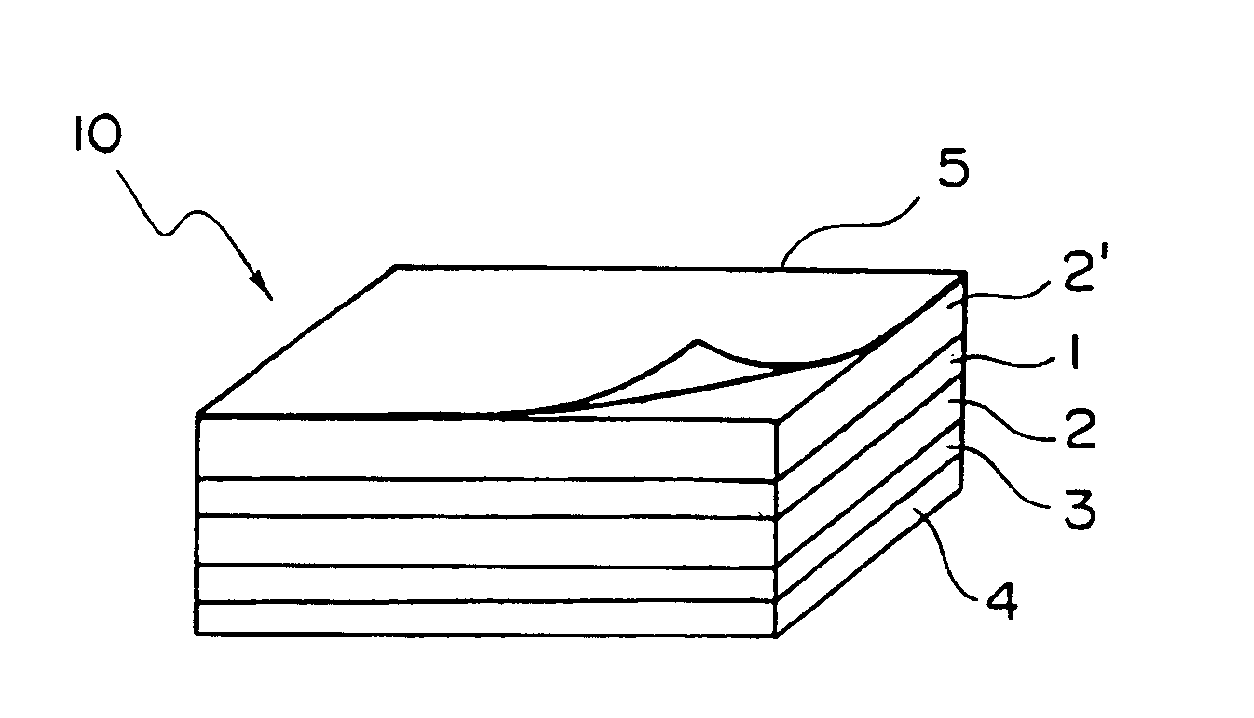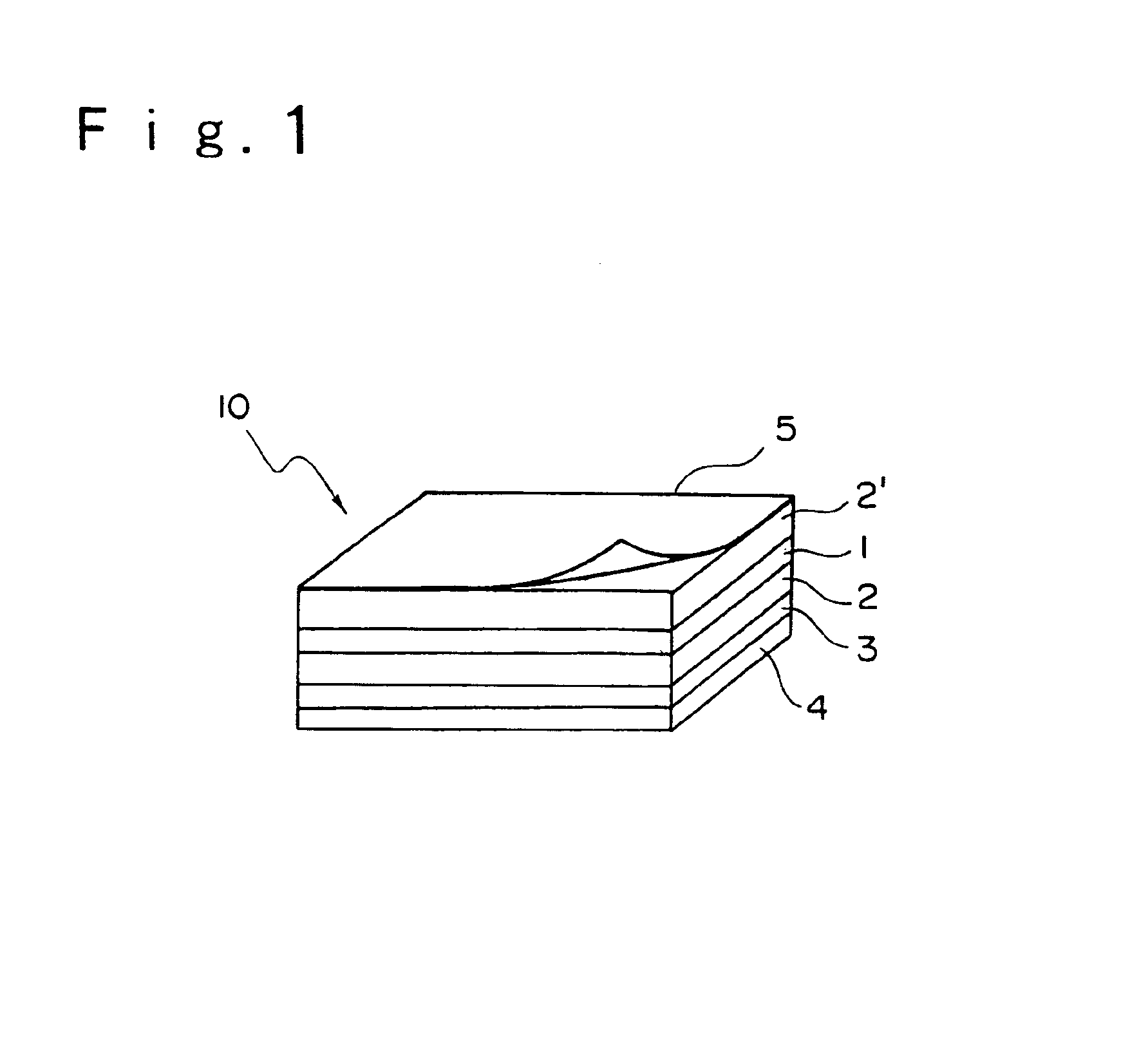Adhesive composition and adhesive sheet and adhesive optical component using the composition
a composition and adhesive technology, applied in the direction of adhesive types, transportation and packaging, synthetic resin layered products, etc., can solve the problems of poor dimensional stability of polarizing plates, inability to follow the change in the dimension of substrates, and tend to adhere to the substrate, etc., to suppress lifting and peeling, excellent stress relaxation, and excellent adhesion
- Summary
- Abstract
- Description
- Claims
- Application Information
AI Technical Summary
Benefits of technology
Problems solved by technology
Method used
Image
Examples
example 1
[0099]Into 200 parts by weight of toluene, 100 parts by weight of a copolymer of acrylic esters having a weight-average molecular weight of 1,500,000 (containing 84% by weight of the unit of butyl acrylate, 15% by weight of the unit of methyl acrylate and 1% by weight of the unit of 2-hydroxyethyl acrylate), 0.5 parts by weight of a difunctional adduct of isophorone diisocyanate (manufactured by MITSUBISHI KAGAKU Co., Ltd.; the trade name: NY-T-35C; the weight-average molecular weight: 3,000) and 0.2 parts by weight of a silane coupling agent (3-glycidoxypropyltrimethoxysilane) were added and a solution of an adhesive was prepared.
[0100]A substrate sheet of a polyethylene terephthalate film having a thickness of 38 μm which was coated with a silicone resin on one face (manufactured by LINTEC Corporation; the trade name: SP PET38) was coated with the solution of an adhesive prepared above on the face coated with a silicone resin. The substrate sheet coated with the solution of an adh...
example 2
[0104]Into 200 parts by weight of toluene, 100 parts by weight of the copolymer of acrylic esters used in Example 1, 0.1 part by weight of the difunctional adduct of isophorone diisocyanate used in Example 1, 0.1 part by weight of a trifunctional adduct of xylylene diisocyanate (manufactured by TAKEDA YAKUHIN KOGYO Co., Ltd.; the trade name: TAKENATE D-110N; the weight-average molecular weight: 1,100) and 0.2 parts by weight of the silane coupling agent used in Example 1 were added and a solution of an adhesive was prepared.
[0105]Subsequently, the same procedures as those conducted in Example 1 were conducted. The results of evaluation of the properties are shown in Table 1.
example 3
[0106]Into 400 parts by weight of toluene, 100 parts by weight of the copolymer of acrylic esters used in Example 1 and 0.5 parts by weight of the difunctional adduct of isophorone diisocyanate used in Example 1 were added and a solution of an adhesive was prepared Subsequently, the same procedures as those conducted in Example 1 were conducted. The results of evaluation of the properties are shown in Table 1.
PUM
| Property | Measurement | Unit |
|---|---|---|
| molecular weight distribution | aaaaa | aaaaa |
| shear modulus | aaaaa | aaaaa |
| shear modulus | aaaaa | aaaaa |
Abstract
Description
Claims
Application Information
 Login to View More
Login to View More - R&D
- Intellectual Property
- Life Sciences
- Materials
- Tech Scout
- Unparalleled Data Quality
- Higher Quality Content
- 60% Fewer Hallucinations
Browse by: Latest US Patents, China's latest patents, Technical Efficacy Thesaurus, Application Domain, Technology Topic, Popular Technical Reports.
© 2025 PatSnap. All rights reserved.Legal|Privacy policy|Modern Slavery Act Transparency Statement|Sitemap|About US| Contact US: help@patsnap.com


